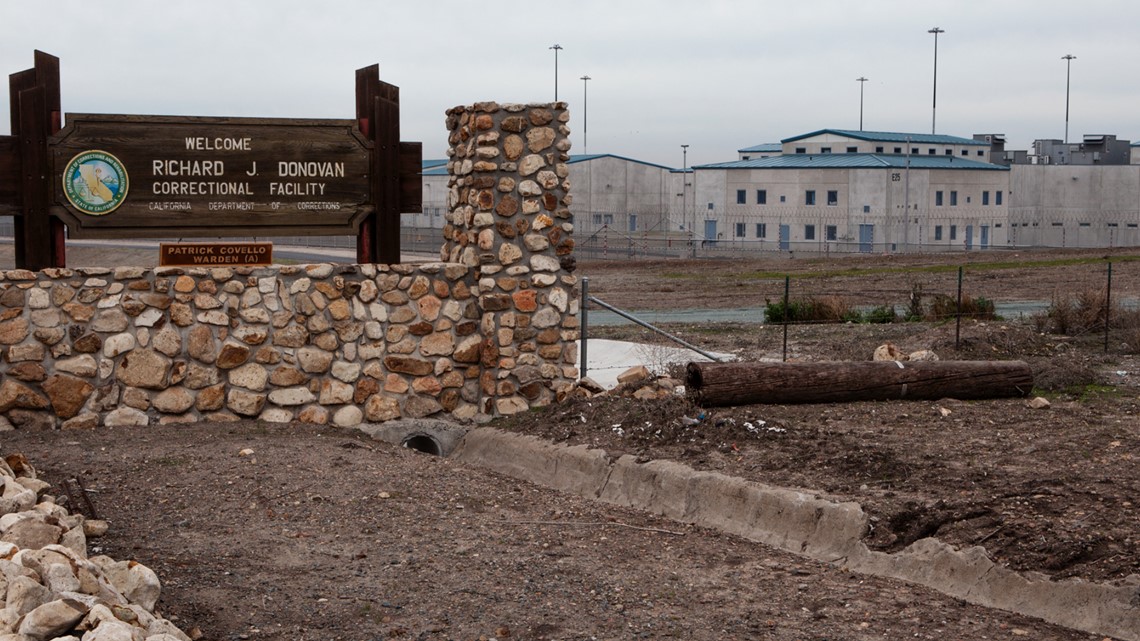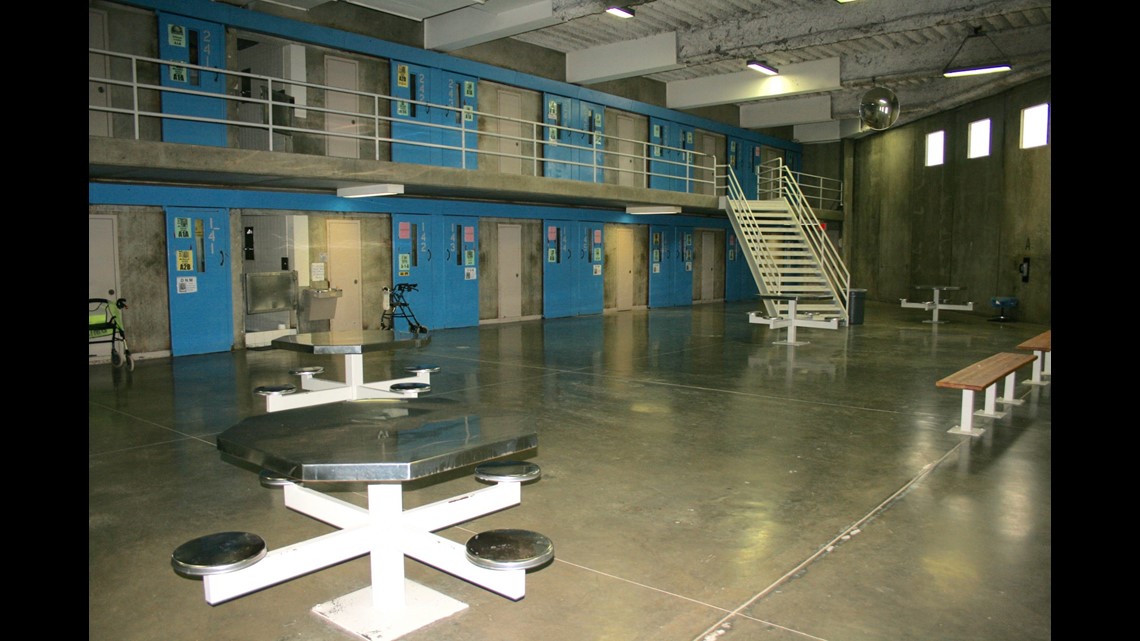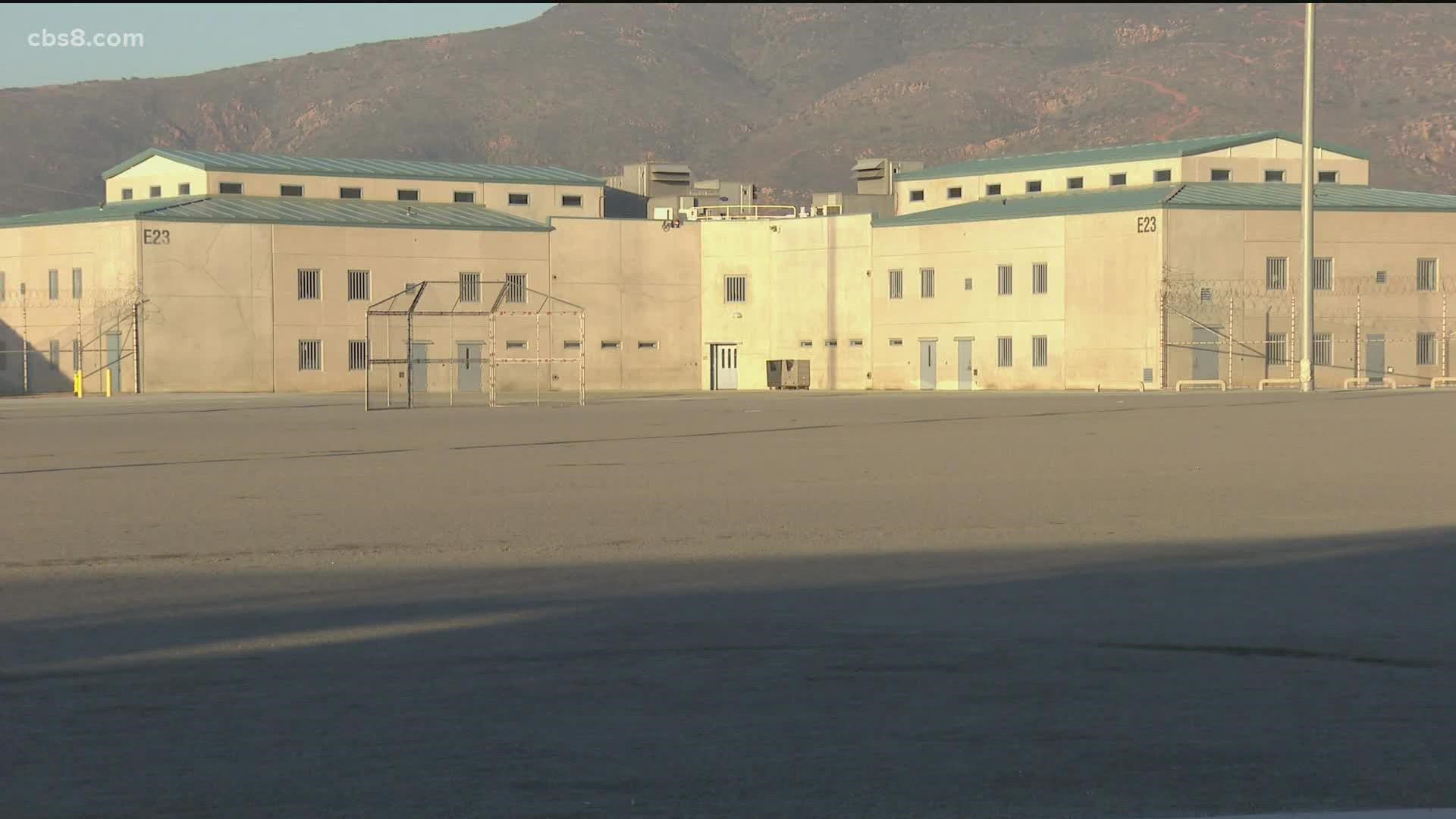SAN DIEGO COUNTY, Calif. — The warden of San Diego County’s state prison retired this month after holding the job for two years, during which he faced questions about his disciplinary and pandemic-related decisions and the prison’s commitment to making court-ordered reforms.
Just weeks after Marcus Pollard was named acting warden at Richard J. Donovan Correctional Facility in August 2019, he declined to discipline an officer accused of punching his girlfriend and severing her thumb when he slammed it in a truck door –– a decision a state watchdog disagreed with.
During the pandemic, Donovan tallied among the highest COVID-19 death tolls in California prisons. inewsource reported that at least three men were found dead or dying in their cells from COVID-19 during a deadly winter outbreak. Staff were overwhelmed during an explosive rise in cases, despite Pollard’s assurances months before the outbreak that the prison was prepared.
On top of that, Pollard’s departure comes while the prison and the state corrections department grapple with a recent court order mandating sweeping reforms at Donovan resulting from ongoing litigation beginning in the 1990s. Court records have pointed to a culture of retaliation among corrections staff.
Pollard’s last day was Nov. 2, 2021. He retired at the age of 56. His salary was more than $180,000.
Pollard’s exit marks the third time in a little over three years that the prison has changed leadership.
Patrick Covello, Pollard’s predecessor, left Donovan in 2019 to take the reins at a prison near Sacramento. The warden before him served seven years at Donovan. Pollard was appointed to the post in November 2020 after serving as acting warden before that.
“Richard J. Donovan has been extremely challenging to me as the Warden, but it has also been rewarding,” Pollard wrote in a brief notice of resignation.
“I have served the State for over 27 years and it is time to enjoy my family,” Pollard wrote.
In the notice of resignation, Connie Gibson, director of California Department Corrections and Rehabilitation’s Division of Adult Institutions, heaped praise on Pollard.
“I would also like to take this opportunity to express my gratitude to retiring Warden Marcus Pollard for 27 years of exemplary service to the Department,” she wrote.
inewsource reached out to Pollard multiple times for this story. He has not responded to those requests for comment.
Disciplinary decision under fire
Pollard’s tenure leading Donovan started with a decision the state’s watchdog for prisons thought was so questionable it prompted a review and a public report.
A Donovan correctional officer was criminally charged after a fight with his girlfriend left her with six stitches and a severed thumb.
Pollard withdrew the previous warden’s disciplinary action against the officer, in agreement with a Skelly officer, who presided over the disciplinary proceedings, and high level department officials who said there were inconsistencies in the girlfriend’s story and a lack of evidence pointing to the officer’s guilt.
A report from the Office of Inspector General published in June 2020 concluded that the corrections officer should nevertheless have been disciplined.
inewsource is first to report that the OIG was writing about Donovan and Pollard.
The OIG published the report without naming the prison, warden or corrections officer involved. However, inewsource confirmed through court records and through the Inspector General’s public information officer, Shaun Spillane, that the report concerns Donovan and former-warden Pollard.
The report from the OIG, an independent state prison oversight agency, accused Pollard and other officials of faulty decision-making and criticized the state corrections department’s tendency to give “undue credence” to its officers.
The decision not to discipline the officer “ignores the dynamics of domestic violence, revictimizes the girlfriend who suffered through a traumatic event and is permanently disfigured, and allows the officer to remain discipline free and maintain his position of authority,” the OIG wrote.


The accused officer still works at Donovan today. The corrections department refused to provide inewsource with his internal personnel record.
inewsource is not naming the corrections officer because the criminal charges against him were eventually dropped.
[Text Wrapping Break]On Dec. 15, 2018, Carlsbad police responded to a call from a woman who said her boyfriend, a correctional officer, punched her in the face and severed her thumb by slamming a truck door on her hand, according to the report and court documents.
The girlfriend said the correctional officer sped off before authorities arrived, the report said.
Medical personnel brought the woman to a hospital where she received six stitches for a laceration on her lip.
Police located the woman’s severed thumb in the parking lot of her apartment complex, but medical personnel couldn’t reattach it because it had been severed down to the first joint, the report said.
The next day, police arrested the officer at Donovan. He was charged in San Diego County with two felonies: mayhem and corporal injury to a spouse or roommate, court records show.
The judge ordered a criminal protective order, routine in domestic abuse cases, against the officer and a jury trial was set for Aug. 5 2019. The officer was also forced to surrender a Glock 43 to police, according to court documents.
The district attorney’s office dropped the charges against the officer the day the trial was set to take place, according to court documents. The OIG report said the charges were dropped after the girlfriend sent the officer an email saying she couldn’t exactly remember how she had been injured.
Tanya Sierra, public affairs officer for the San Diego County District Attorney’s Office, said in an email that the office “can only proceed with a case if we believe we can prove it beyond a reasonable doubt.”
The day after the charges were dropped, then-warden Patrick Covello decided to terminate the officer after reviewing the corrections department’s internal investigation into the alleged assault.
Covello found the evidence supported the allegation that the officer assaulted his girlfriend and he found that the officer lied to investigators about the assault, according to the report. He did not believe the evidence supported the mayhem allegation, which is a criminal charge involving maiming a person’s body part or lacerating their face.
But less than a week later, Pollard took over as acting warden at Donovan. The next month, September 2019, the department held a Skelly hearing for the officer, where the state presents the allegations to the accused officer and the officer’s representative makes a defense.
After the hearing, Pollard walked back the decision to terminate the officer –– dropping the allegations against him that the previous warden had sustained weeks before.
Instead, Pollard sided with the Skelly officer, a prison official who oversees the hearing and makes a recommendation to the warden about whether or not to impose discipline.
According to the Inspector General report, “The Skelly officer heard a presentation by the officer’s attorney and, based on the presentation, concluded that there were inconsistencies in the girlfriend’s statements and that the officer ‘presented himself humbly, very confident in his demeanor, and body language was agreeing [sic] with the statements of his legal representation.’”
When the OIG asked Pollard how he thought the girlfriend got her injuries, Pollard blamed the girlfriend and guessed that “she could have tripped and fallen,” according to the report.
The department’s attorney, who had originally supported the previous warden’s decision to dismiss the officer, also agreed with the Skelly officer’s recommendation, saying she no longer believed the department could prove its case against the officer, according to the report.
Despite the OIG’s appeals to several department executives, they upheld the decision, noting that “there were not third-party witnesses to the incident, it was a ‘he said/she said’ situation, there were inconsistencies in the girlfriend’s statements, and, after criminal charges were filed, the girlfriend had sent an email message to the officer stating she could no longer recall exactly how she sustained the injuries that night.”
The department said the evidence couldn’t prove the officer more likely than not assaulted his girlfriend –– the standard of proof required to discipline public employees in California.
Still, the OIG said in the report that the department should have disciplined the officer, arguing that the girlfriend’s statements on her 9-1-1 call, to police and to the neighbor were consistent and her injuries were in line with how she said she was injured.
Dana Simas, press secretary for the California Department of Corrections and Rehabilitation, refused to acknowledge that the incidents in the OIG report took place at Donovan. Instead, Simas referred back to the report and a letter from the department secretary defending their position.
“It explains that after multiple levels of executive review of the testimonies and all evidence, there was not enough to support imposing discipline against the officer,” Simas said in an email.
“We take every allegation of staff misconduct very seriously, and work hard to ensure there is accountability when allegations are sustained,” Simas said.
Simas declined to comment on Pollard’s work performance, which is standard practice within the agency.
While Pollard was warden, he suspended 11 corrections staff, reduced salaries for 55 corrections staff and dismissed 20 as a result of disciplinary proceedings. He also approved 20 official letters of reprimand, Simas said.
The corrections officer, who started at Donovan in February 2017, makes more than $100,000 a year in his job at the prison.
‘How could you let this happen?’
Pollard’s handling of a deadly coronavirus outbreak in the prison also raised questions about his and Corrections’ leadership.
At least 18 Donovan residents have died from COVID-19 since the beginning of the pandemic –– the fifth highest death count among prisons in the state. Donovan also has the fifth highest death count per incarcerated person based on June 2021 prison populations, making the death rate at the time the highest among the state’s 21 largest prisons.
Populations in the state’s 34 prisons have fluctuated significantly over the course of the pandemic.
Those numbers don’t include an additional 33 deaths at the prison, between the beginning of the pandemic and June 2021, which were reported as not COVID-19 related, according to state correctional data.
Early on in the pandemic, Donovan had been relatively untouched by the virus, state corrections COVID-19 data shows. That changed in Dec. 2020, when reported cases suddenly surged, and deaths followed suit. COVID-19 cases and deaths were spiking throughout California and the nation at that time.
In a span of eight days in late December 2020 and early January 2021, eight Donovan residents died from COVID-19.
Three of those men, all 65 or older with pre-existing medical conditions, were found dead or dying in their cells by staff, inewsource reporting revealed. The cellmate of one of those men said Donovan staff denied the man medicine he requested to soothe his throat after he had tested positive for COVID-19 and had been coughing a lot, including through the night.


Public health experts who spoke to inewsource in April said prison staff should frequently monitor and test higher risk residents and criticized the prison, saying the men should not have been found unresponsive in their cells.
“Nobody should be dying alone in a cell,” Rebecca Fielding-Miller, an assistant professor of public health at UC San Diego, said at the time, adding “there’s a lot of things you can do to prevent that.”
The corrections department said COVID-19 positive residents are checked on regularly and brought to the hospital if needed, but it acknowledged in court documents that corrections staff, overwhelmed with the winter outbreak, also failed to isolate COVID-19 positive residents from those not infected.
That December, Donovan issued its staff the highest number of citations for not complying with mask mandates and social distancing of any state prison.
inewsource reported that families of those incarcerated were often left in the dark while their loved ones fell ill or died from the virus. The family of one Donovan resident who died from COVID-19 said they weren’t notified about the death until a month after it happened.
Mary Estrada, who served on Donovan’s Inmate Family Council, said Pollard assured her and others in council meetings that the prison was prepared to handle COVID-19.
In December, when cases started going up, she said she called out Pollard, along with other prison leaders, saying, “Pollard, you should've had a handle on this. How could you let this happen? This is on your watch. You assured us that you had COVID covered and you did not,” Estrada said.
Estrada’s husband, who is incarcerated at Donovan, got sick with COVID-19 during the winter outbreak. She said he still suffers from related lung issues.
By the Inmate Family Council meeting in January, more than a dozen residents had died from the virus.
Pollard attributed the severity of the outbreak in part to the health status of some of the inmates there.
“Our numbers were low for 10 months and then we were hit hard with 600 plus positive inmates … Staff was also hit hard with one death. This is a high-risk medical facility and once some contract the virus, it proves hard to fight off,” Pollard said, according to the meeting’s minutes.
All told, the prison has seen almost 1,000 infections among residents and more than 600 infections among staff.
As of Nov. 12, Donovan’s resident population is 84% fully vaccinated, according to state corrections data. Sixty-six percent of the prison staff are vaccinated, slightly higher than the state prison staff average.
Members of the California Correctional Supervisors Organization who worked with Pollard praised him, Paul Curry, a legislative advocate with the organization, said.
Curry said the pandemic created particularly difficult circumstances for wardens across the state with guidance and policies changing quickly.
“All of the members that we spoke to speak very highly of warden Pollard,” Curry said.
Reforms meet resistance, some say
With two years at the helm, Pollard led Donovan at the tail end of decades-long litigation against the state corrections department stemming in part from the alleged abuse of incarcerated people with disabilities at the facility, which is near the U.S.-Mexico border.
He was, however, in charge when a federal court ordered the prison to instate sweeping reforms to correct issues raised in the lawsuit, Armstrong v. Newsom.
Those reforms included implementing body-worn cameras for corrections staff who work with disabled residents and improvements to the investigative process for staff misconduct.
Court filings raise questions about prison staff’s willingness to embrace the reforms.


In letters to the court since January 2021, four Donovan residents have claimed that retaliatory conduct from corrections staff has continued, especially toward residents involved in the Armstrong litigation, and often in the form of false rules violation reports, which could affect a person’s time in prison.
Another resident wrote that “officers are routinely turning off body cameras” and blocking complaints against staff to perpetuate “the code of silence here at RJD.”
Corrections officials said officers have been using body-worn cameras at the prison since January, but the prison has yet to release any body-worn camera footage to inewsource after requesting those records in August.
Over the past year, the department said, it has been building the personnel team, equipment, procedures and training to locate specific footage and release it to the public, the department said.
In his notice of resignation, Pollard wrote that he was “100% dedicated” to “changing the public perception related to the Armstrong Class members.”
The new acting warden, Raymond Madden will lead Donovan while the prison continues to carry out Armstrong reforms, including anti-retaliation mechanisms, changes to staff misconduct investigation and discipline and increased training and staffing.
Madden took over at the beginning of October when Pollard took his annual leave one month ahead of his retirement. Madden was previously warden at Centinela State Prison in Imperial County, according to the state corrections website.

